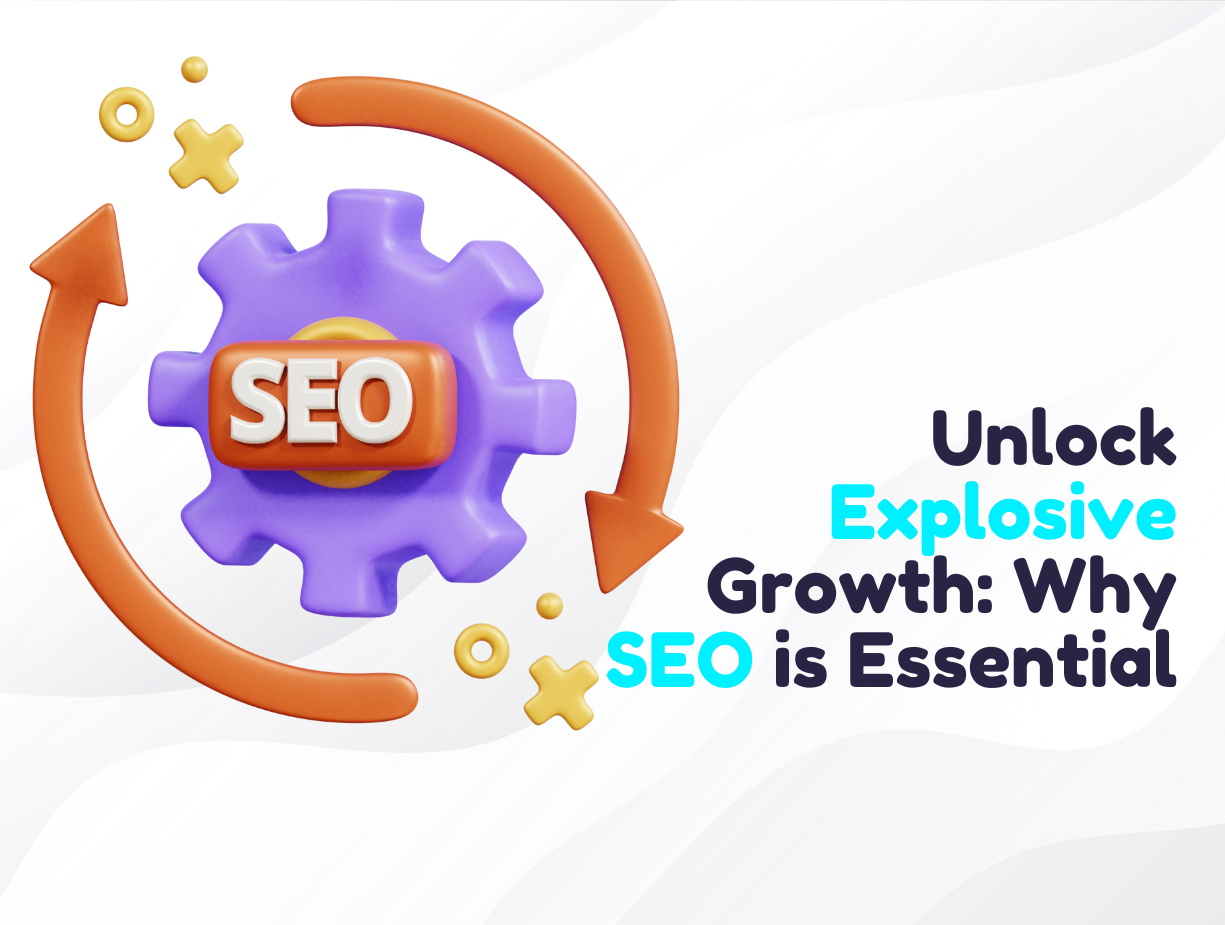Search Engine Optimization (SEO) has emerged as a game-changing strategy for driving online success. Understanding why SEO is essential can unlock explosive growth for your business, enhancing visibility, boosting traffic, and maximizing revenue. This comprehensive guide will delve into the power of SEO, exploring its key benefits and offering actionable insights for leveraging its full potential.

What is Search Engine Optimization?
Search Engine Optimization (SEO): A Comprehensive Guide to Unlocking Growth visit for More: Link
Search Engine Optimization (SEO) is one of the most powerful digital marketing strategies available today. It involves a set of practices and techniques designed to improve a website’s visibility on search engine results pages (SERPs). The goal of SEO is simple: make it easier for users to find your website through organic search. By optimizing your website and its content, SEO aims to improve your site’s ranking for relevant keywords, which in turn drives more targeted traffic, increases user engagement, and ultimately leads to greater business success. SEO is a multifaceted approach that requires a careful understanding of search engines and their algorithms, as well as strategic implementation of various techniques. Visit: Techwave Digital Service
SEO is essential for every website, whether you are running an online store, a blog, or a corporate site. It can drastically improve the user experience, making it easier for potential customers to discover your business and interact with your offerings. SEO does not just happen overnight—it’s a long-term strategy that helps businesses stay ahead in an increasingly competitive online market.
At the heart of any successful SEO strategy is a focus on quality content and user experience. When implemented correctly, SEO can help a website not only rank higher in search results but also establish its authority within the industry. To achieve these results, businesses need to understand the key components of SEO and how they work together to achieve explosive growth.
Key Components of SEO
- Keyword Research: Identifying the Right Terms to Target
One of the first steps in any successful SEO strategy is keyword research. Keywords are the terms and phrases potential customers type into search engines when looking for products or services. By identifying the most relevant and valuable keywords for your business, you can tailor your content to meet the needs of your audience. Keyword research helps you understand the language your target audience is using and allows you to create content that addresses their questions and concerns.
When conducting keyword research, it’s important to focus not only on high-traffic keywords but also on long-tail keywords, which are more specific phrases that often convert better because they reflect a more precise intent. Tools like Google Keyword Planner, Ahrefs, and SEMrush can help you discover the best keywords for your industry and your target audience. For a deeper understanding of keyword research, you can refer to this Comprehensive Guide on Keyword Research.
- On-Page SEO: Optimizing Content for Better Ranking
Once you’ve identified your target keywords, the next step is to implement them effectively on your website through on-page SEO. This refers to optimizing individual pages of your website to rank higher in search engines and attract more relevant traffic. On-page SEO includes several key factors:
-
Title Tags and Meta Descriptions: These HTML elements provide information to search engines and users about the content of the page. A well-crafted title tag and meta description can significantly improve click-through rates.
-
Headings and Subheadings: Using headings (H1, H2, H3) properly organizes your content and makes it easier for both search engines and users to understand the structure of your page. It also improves the user experience.
-
Content Optimization: High-quality, engaging, and informative content is key to ranking well in search engines. SEO requires that you not only use the target keywords strategically but also ensure the content is relevant, valuable, and helpful to your audience.
-
Image Optimization: Images play a key role in enhancing the user experience. However, they must be optimized for both search engines and loading speed. Compressing images and using descriptive file names and alt text can improve your rankings and site performance.
-
Internal Linking: Adding links between your own pages helps search engines crawl your website more efficiently and improves user navigation.
For more tips on optimizing your web pages, check out this detailed guide on On-Page SEO Best Practices.
- Off-Page SEO: Building Authority Through External Factors
Off-page SEO focuses on improving your website’s reputation and authority through external elements. One of the most important aspects of off-page SEO is backlinks—links from other reputable websites that point to your pages. Backlinks are seen by search engines as a vote of confidence in your website, signaling that your content is valuable and credible.
Building quality backlinks requires a strategic approach. You can earn backlinks by guest blogging, creating high-quality shareable content, or building relationships with influencers and thought leaders in your industry. It’s important to focus on the quality, not the quantity, of backlinks. Links from high-authority websites (such as well-established media outlets or industry leaders) have a much greater impact on your ranking than links from low-quality sites.
Check out this Guide to Building Backlinks for more insights into how to successfully earn backlinks for your website.
- Technical SEO: Ensuring Search Engines Can Crawl and Index Your Site
Technical SEO focuses on optimizing the technical aspects of your website to ensure search engines can easily crawl and index your site. This includes a variety of factors that affect how well search engines can interact with your website:
-
Site Speed: Google has made it clear that page speed is an important ranking factor. Websites that load faster provide a better user experience and are more likely to rank higher in search results.
-
Mobile-Friendliness: With more people browsing the internet on mobile devices, having a responsive website that looks great on any device is crucial. Mobile-friendly websites are prioritized in mobile search rankings.
-
Secure Website (HTTPS): Websites with a secure connection (HTTPS) are favored by search engines. If your site isn’t secure, it could hurt your rankings and discourage users from engaging with your content.
-
XML Sitemap: An XML sitemap helps search engines crawl your site more efficiently by providing a roadmap of your pages. It’s essential for large websites with many pages.
For more on technical SEO, visit this Technical SEO Checklist.
Why SEO is Crucial for Explosive Growth
SEO is essential for driving organic traffic to your website, which is one of the most cost-effective ways to attract new customers. Unlike paid advertising, which stops once the budget runs out, the results from SEO can last long-term and continue to provide valuable leads without additional costs.
By consistently optimizing your website for SEO, you can build a sustainable presence that attracts visitors consistently over time. Additionally, SEO helps you establish trust with your audience. When users see your website ranking at the top of search results, they perceive your business as an authority in your field.
Finally, SEO is a holistic approach that affects many aspects of your business beyond just your website’s ranking. It improves user experience, increases brand visibility, drives traffic, and boosts conversions, all of which contribute to business growth.
To dive deeper into SEO and how it can transform your business, check out our full range of resources TechWave’s Exciting Web Development Trends You’ll Love in 2024
In conclusion, SEO is not just a trend—it’s a necessary tool for any business looking to grow in the digital age. By focusing on the key components of SEO, such as keyword research, on-page SEO, off-page SEO, and technical SEO, you can unlock explosive growth and see a significant improvement in your website’s traffic, rankings, and user engagement. Start optimizing your website today to reap the benefits of a solid SEO strategy and take your business to new heights.
For more information and in-depth resources on mastering SEO, feel free to explore our comprehensive guides and helpful tips on our website.
The Power of SEO: Why It’s Essential
1. Drive Targeted Traffic
One of the most compelling reasons to invest in SEO is its ability to drive targeted traffic to your site. When your website ranks higher for relevant keywords, it attracts visitors who are actively searching for what you offer. This means you’re reaching potential customers who are more likely to convert, leading to higher-quality leads and increased sales.
Powerful Insight: According to HubSpot, 75% of users never scroll past the first page of search results. SEO helps you secure a top spot, making your business visible to a large audience actively seeking your products or services.
2. Boost Brand Visibility and Credibility
Achieving a high ranking on search engines not only drives traffic but also enhances your brand’s visibility and credibility. Consumers often associate high-ranking sites with trustworthiness and authority. By appearing at the top of SERPs, your brand gains credibility, leading to increased trust and recognition among your target audience.
Powerful Insight: A study by BrightEdge found that organic search drives 53.3% of all website traffic. This underscores the importance of maintaining a strong SEO presence to ensure your brand is seen and trusted.
3. Generate Cost-Effective Leads
Compared to traditional advertising methods, SEO is a cost-effective way to generate leads. Unlike paid advertising, which requires ongoing investment, SEO efforts can lead to long-term, sustainable results. Once you achieve a high ranking, you can continue to attract traffic and generate leads with minimal ongoing costs.
Powerful Insight: According to Moz, the average cost per lead from SEO is 61% lower than from paid search advertising. This makes SEO a highly efficient and budget-friendly option for lead generation.
4. Enhance User Experience
SEO isn’t just about search engines; it’s also about providing a better experience for your users. Search engines prioritize user-friendly sites that offer valuable content and a seamless browsing experience. By optimizing your website for SEO, you inherently improve its usability, leading to higher engagement, longer visit durations, and lower bounce rates.
Powerful Insight: Google’s search algorithms prioritize sites that deliver a positive user experience. According to Google, a one-second delay in page load time can lead to a 7% reduction in conversions, highlighting the importance of SEO in enhancing site performance.
5. Stay Ahead of the Competition
In a competitive market, staying ahead of your rivals is crucial. SEO helps you gain a competitive edge by improving your online presence and outranking competitors on search engines. By investing in SEO, you ensure that your business remains visible and competitive, even as new players enter the market.
Powerful Insight: A study by Search Engine Journal reveals that 70.6% of marketers see SEO as more effective than PPC for generating sales. This emphasizes SEO’s role in maintaining a competitive advantage in your industry.
How to Leverage SEO for Explosive Growth
1. Conduct Thorough Keyword Research
Effective SEO begins with understanding the keywords that matter most to your business. Use tools like Google Keyword Planner, SEMrush, or Ahrefs to identify high-traffic, low-competition keywords that align with your business goals. Integrate these keywords strategically into your content to drive targeted traffic.
2. Optimize On-Page Elements
Ensure that each page of your website is optimized for search engines. Focus on crafting compelling meta titles and descriptions, using header tags effectively, and incorporating relevant keywords into your content. Also, optimize your images with descriptive alt text to improve accessibility and searchability.
3. Build High-Quality Backlinks
Backlinks from authoritative sites are crucial for boosting your site’s credibility and ranking. Develop a link-building strategy that involves creating valuable content that other sites want to link to, guest posting on relevant blogs, and engaging in industry partnerships.
4. Improve Technical SEO
Address technical aspects of your site to ensure it meets search engine standards. This includes optimizing site speed, ensuring mobile responsiveness, implementing secure HTTPS connections, and fixing any broken links or crawl errors.
5. Monitor and Adjust Your Strategy
SEO is an ongoing process that requires regular monitoring and adjustment. Use tools like Google Analytics and Google Search Console to track your site’s performance, analyze user behavior, and identify areas for improvement. Adjust your strategy based on data insights to continually enhance your SEO efforts.
Conclusion
Search Engine Optimization is a powerful tool that can unlock explosive growth for your business. By driving targeted traffic, boosting brand visibility, generating cost-effective leads, enhancing user experience, and staying ahead of the competition, SEO offers unparalleled benefits for your online success. Embrace SEO as a core component of your digital strategy, and watch your business thrive in the competitive online landscape.





